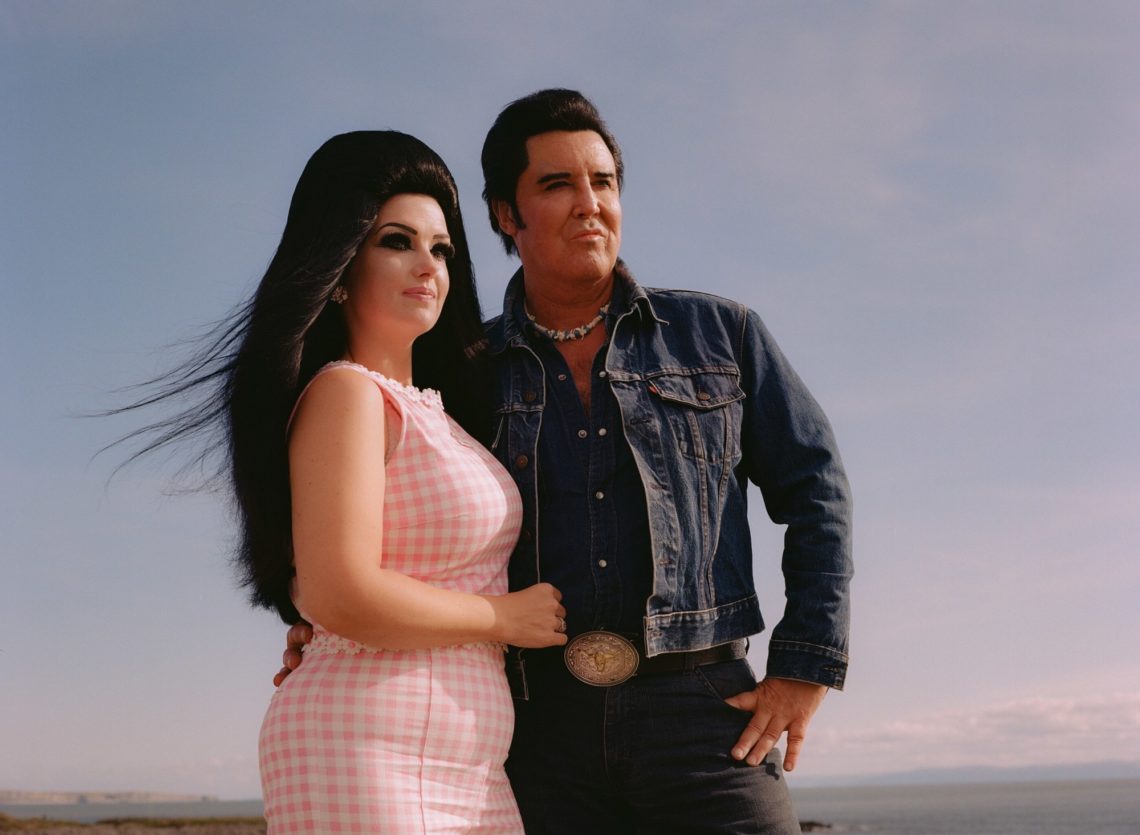This story is from the summer 2025 issue of VICE magazine, THE REASONS TO BE CHEERFUL ISSUE. Get 4 issues each year, sent straight to your door, by subscribing here.
If you were pointed toward a patch of roped-off land, and told to establish upon it your very own, brand new sovereign nation, what would that place be like?
It’s a question that for centuries has beguiled the most inquisitive minds humanity has ever produced—world leaders, utopian dreamers, egomaniacs, late-night stoners—and one that different people, at different moments in time, have answered in very different ways.
Two hundred and fifty years ago, the founding fathers answered it with the Declaration of Independence, hard-launching a nation built around rampant, shameless individualism. Having been relinquished from Soviet rule in 1991, Saparmurat Niyazov decided that Turkmenistan should turn away from the outside world and gradually become the sort of place where any car that isn’t white is outlawed, impounded, and destroyed. Norway was established in 872 by a warrior-king named Harald Fairhair, who defeated a berserker army at the battle of Hafrsfjord. This went some way to dictating the national ethos, for a few hundred years at least.
Last year, an annual gathering of fanatics from all over the world presented a rare opportunity to answer a stupid question: What would it be like to live in a brand new nation founded by Elvis Presley impersonators? In Elvisland, would man and woman be equal? What about those falling either side and in-between? Would outsiders be welcomed with open arms or met at the border with bullets? And would there be any cutting off of heads?
Every year, 40,000 of their kind descend upon the Porthcawl Elvis Festival in South Wales. But who exactly are they and what do they believe in? VICE sent a team to find out.
It was 11AM when we arrived in Porthcawl with our questions, the promenade awash with quiffs and pints gleaming in the sun. Elvises of all shapes and sizes strutted along the seafront, swiveling their hips and unleashing thousands of cartoon grunts into the atmosphere.
Gary, from nearby Ebbw Vale, boasted that he hadn’t missed a festival since it began in 2004. As he fixed his sideburns in the reflection of his campervan window, babies, grandmas, and dogs passed by in full Elvis gear. “Everyone’s coming from miles around, they’re all welcome here in Porthcawl,” he smiled. This generosity of spirit extends beyond the occasion: Gary is proudly pro migration and same-sex marriage, and believes that Elvis would’ve been too.
To prove it, he crooned a verse from “In the Ghetto,” Presley’s 1969 ballad about poverty and violence in inner-city America. “Elvis was a man of the many,” stated Gary, emphatically. “His music was all about bringing people together.”
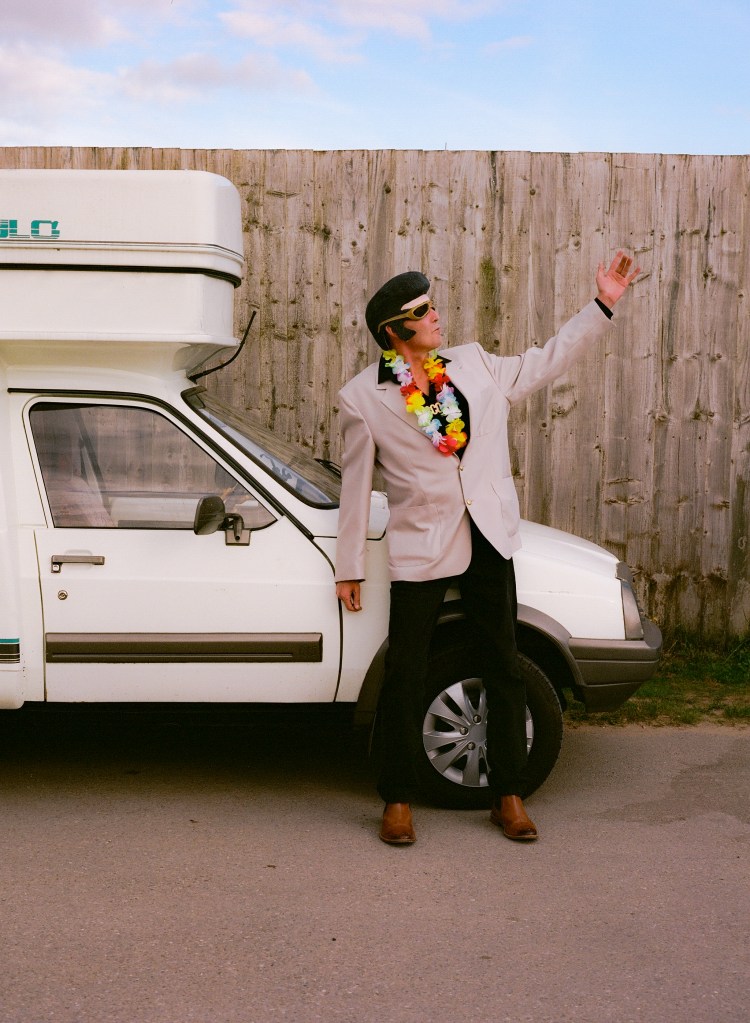
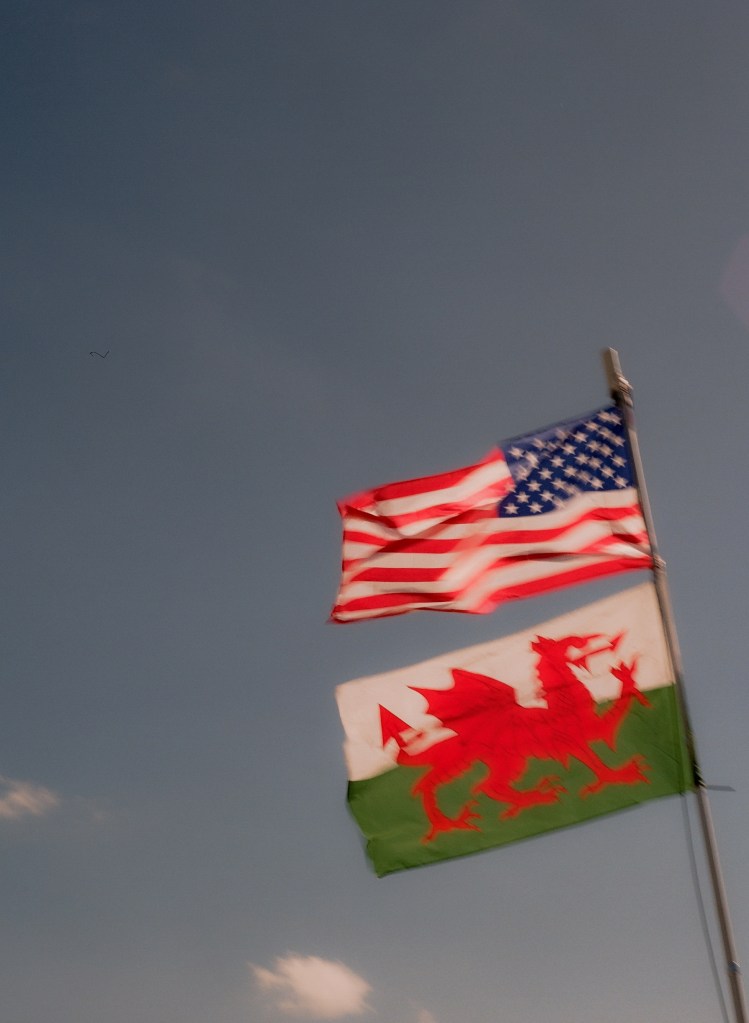
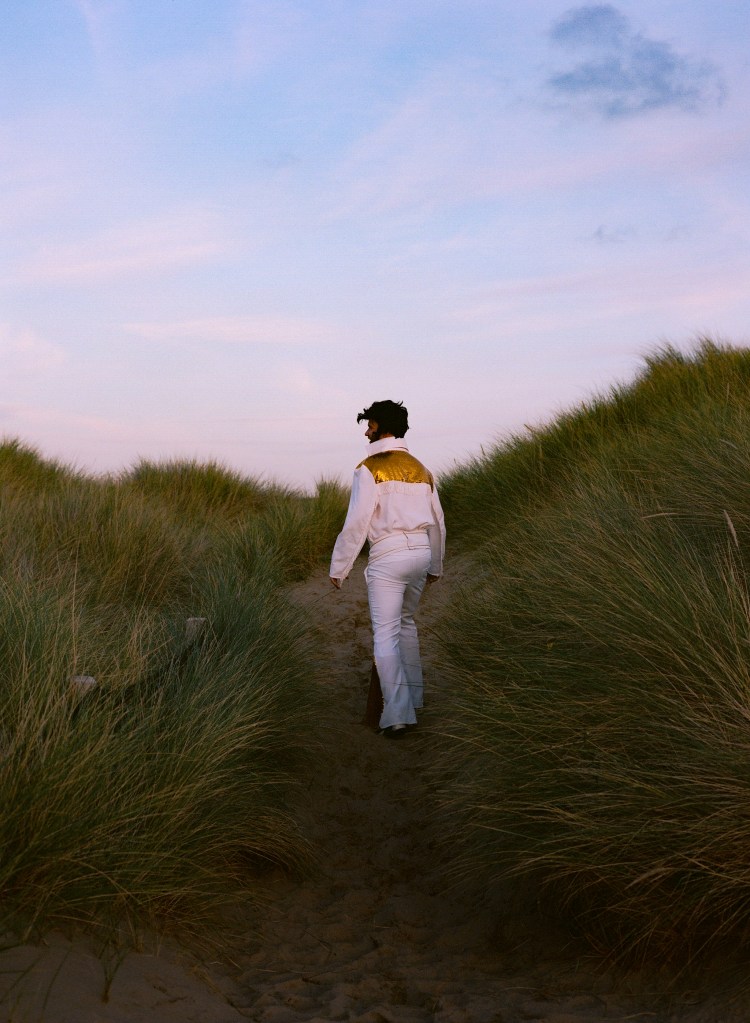
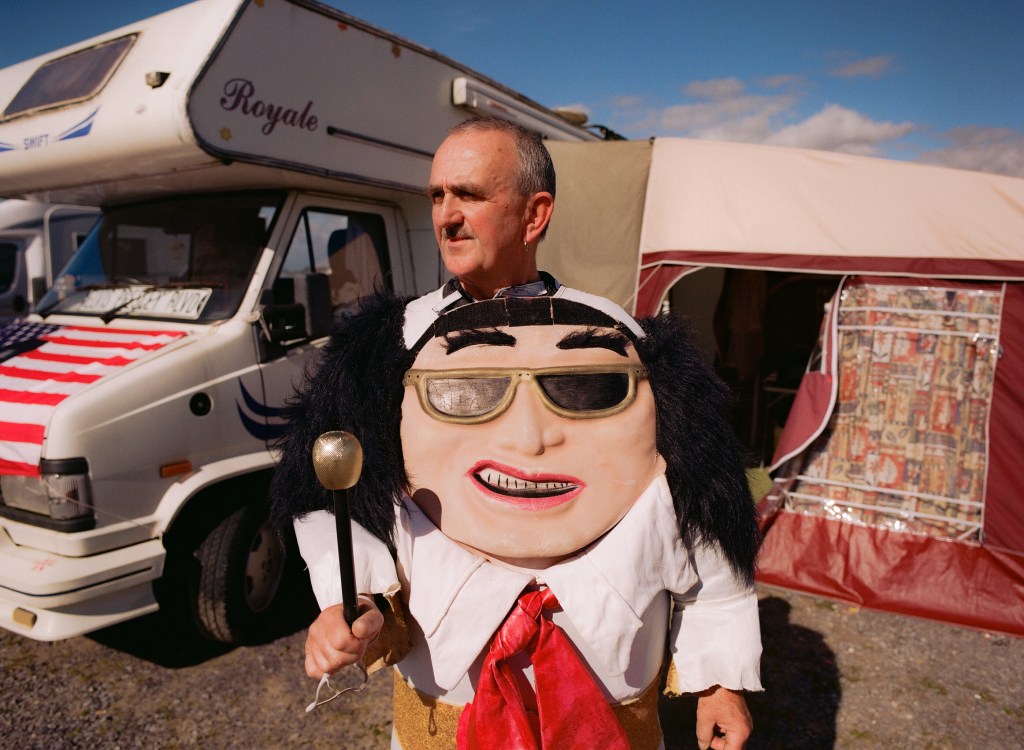
It wasn’t just Welshmen and women who’d flocked here for the chance to compete at the festival’s main event: the Elvis competition. There was a Polynesian-Canadian Elvis who’s been impersonating Elvis since he was five and believes in the death penalty; a ‘Shelvis’—a female Australian Elvis—who refuses to sing his more sexist songs (“We’re in the 21st century now; I won’t sing ‘Baby Let’s Play House’”); and a British-Asian American Elvis who supports open borders and gun control. “Elvis would’ve supported equity, he grew up in an impoverished community. He would’ve evolved into being a good guy,” he said, with quiet conviction.
Though his fans may feel that they are able to divine social messages in Elvis’ lyrics and music, his personal views still remain something of a mystery. At a press conference in 1969, he deflected questions about the Vietnam war and its critics, saying, “I’m just an entertainer, and I’d rather not say.” Elvis’ silence on politics made it all the more jarring when, a year later, he turned up unannounced at the White House with a letter in one hand and a Colt. 45 in the other, demanding a federal narcotics badge from President Nixon. He explained that he wanted to help fight the war on drugs—which is either highly surprising or not at all surprising, depending on how you interpret his own well-documented addiction issues—and posed with the president in a bizarre photo that remains one of the most requested images in the U.S. National Archives.
“There was a Polynesian-Canadian Elvis who’s been impersonating Elvis since he was five and believes in the death penalty”
As a God-fearing patriot who served in the Army, idolized law enforcement, built his fame on Black American music, psychologically and physically abused his wife, and was managed by an undocumented-immigrant conman, it’s hard to ascertain how the King might have voted today.
Political complexities were present too in Porthcawl. A granddad Elvis grumbled about the recent waves of migration into the UK, while proudly gazing down at his mixed-race grandson who squirmed in an Elvis babygrow. His son-in-law—who’d also dressed as Elvis, and whose ancestry likely traces back to warmer climes—didn’t say anything, though his wife quickly interjected. “Anyone should be allowed to come here if their countries aren’t safe,” she said.
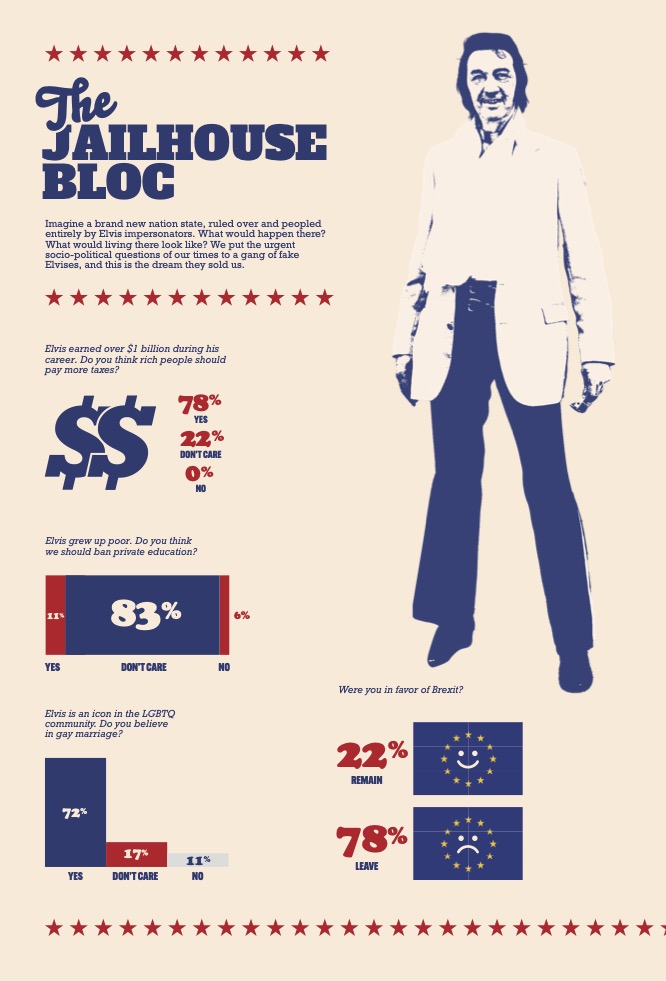
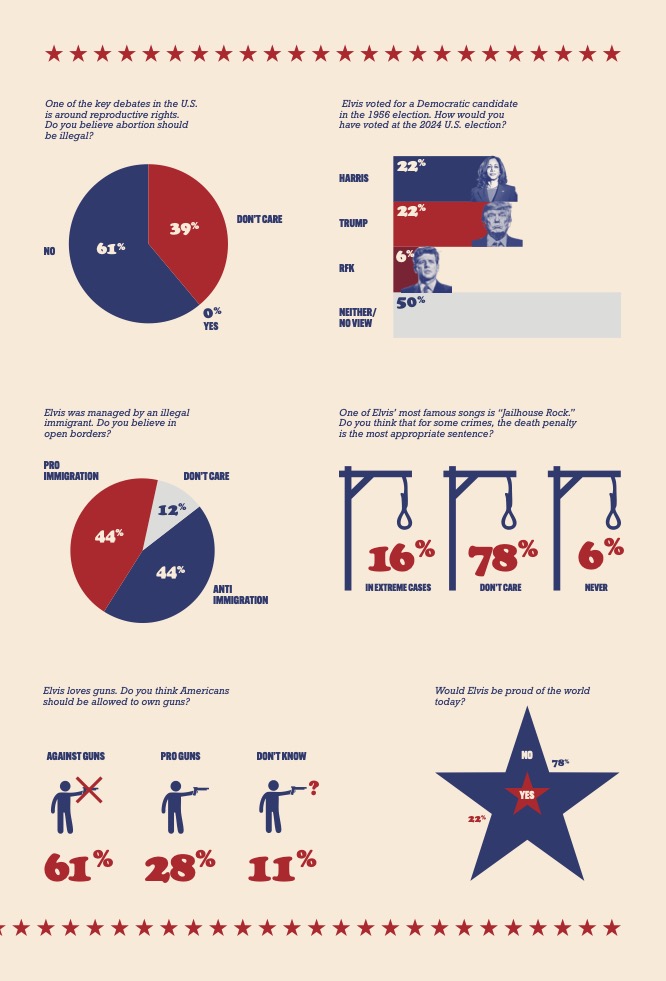
Waiting in line for a show, an uncle and nephew Elvis tag team from Barry Island claimed they’re not anti-immigration, just frustrated: “Hospitals can’t cope. I’ve just put my name down for housing and got told I’ve no chance,” said the elder of the pair, “too many immigrants ahead of me.” His nephew chimed in, voice slightly hoarse from the night before: “Only way me and my girlfriend can move up the list is if we get kicked out by our parents.”
This growing sense of disillusion contrasted garishly with the festival’s broader atmosphere of free-wheeling escapism. The whole of Porthcawl had taken to Elvis like a seagull to chips: There was an Elvis special at a local caff where waiters donned Hawaiian shirts for the week, a guest performance from an Elvis Reverend at a local church, even a Hound Dog Dog Show. “It’s almost like miners’ fortnight has been resurrected,” said the festival’s organizer, Peter Phillips.
Once a booming seaside resort, like so many other British mining towns Porthcawl declined during and after the 11-year tenure of Prime Minister Margaret Thatcher, hollowed out by deindustrialization and passed over for cheap flights abroad.
Then, Elvis saved it. What began as a one-off fundraiser to save a local theater is today a festival that proudly pumps £6 million (just over $8 million) into the local economy each year, injecting a new lease of life into Europe’s largest caravan park, Trecco Bay. Though it draws an international crowd, Phillips estimates that around 90 percent of attendees hail from the Welsh Valleys, making the festival a firm fixture in the national calendar.
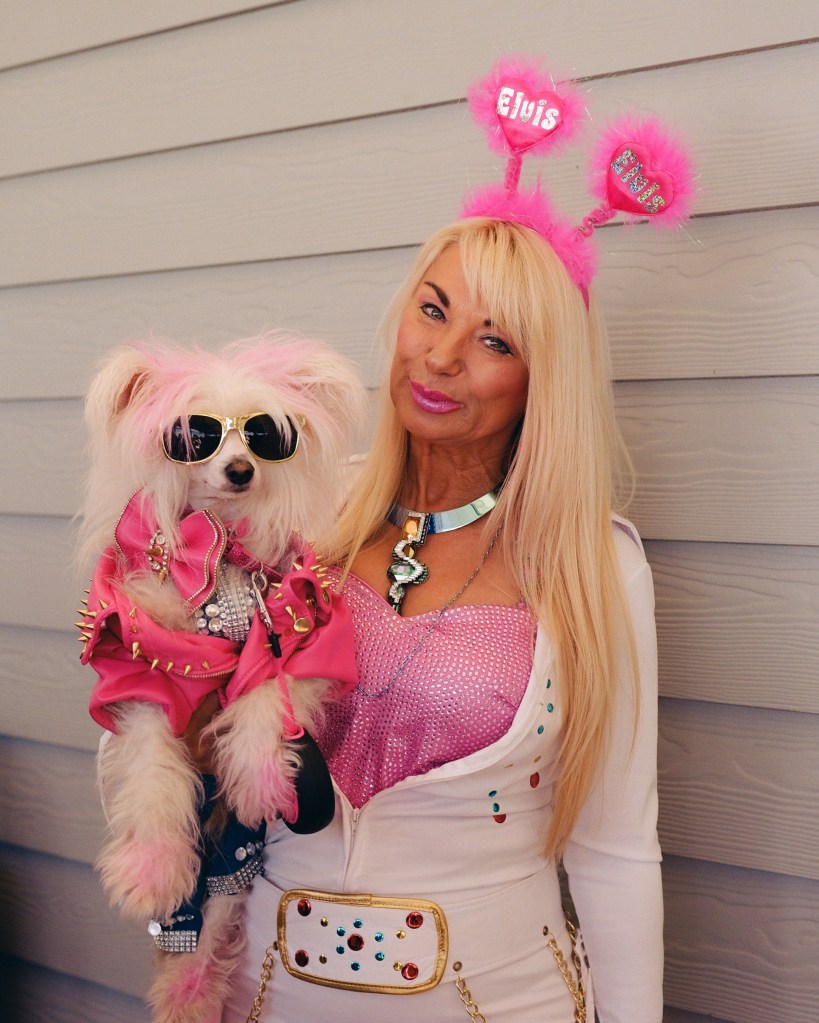
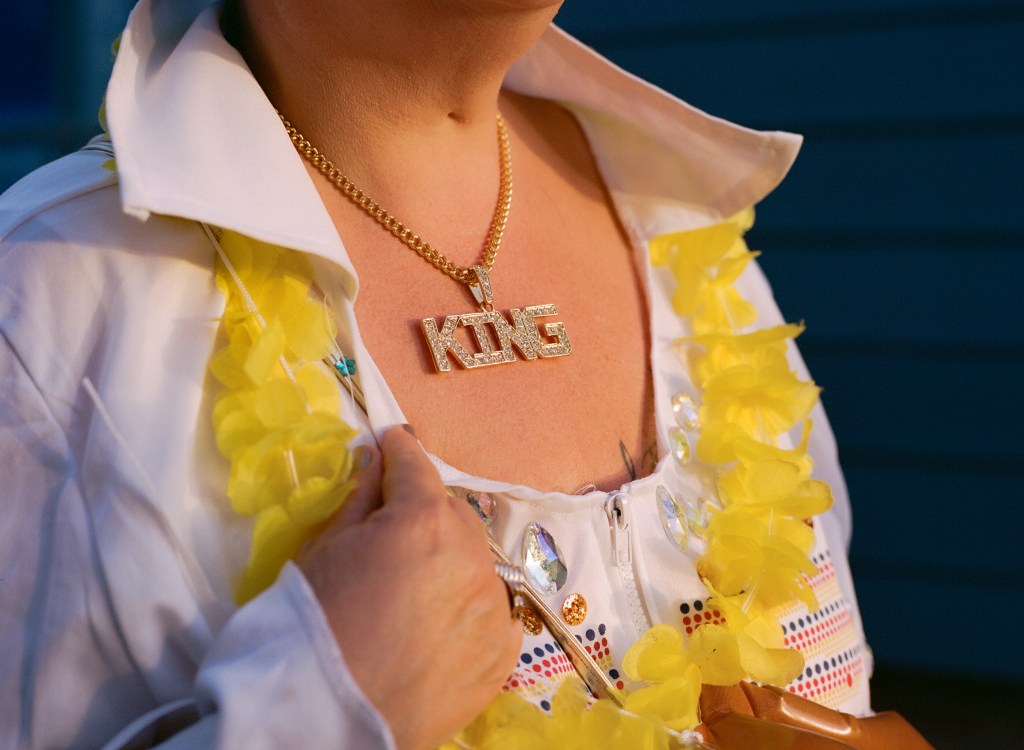
Citing an old local saying—“dress anything in red with a rosette and they’ll vote for it”—Phillips noted how much times have changed. The Labour Party’s grip isn’t what it was in the Valleys. At the time of writing, Reform UK had recently finished second in several South Wales constituencies, including Bridgend. “I voted for Nigel Farage,” said one of the ‘Golden Girlies’—a group of older women in mobility scooters and polka dots who made the somewhat spurious claim that they were the first people to dress up for the festival back in 2005. “He’s true to himself. Everyone’s too scared to speak up now.” The others nodded their head; all have been impacted by Labour’s cuts to winter fuel hand-outs.
If there was one thing most attendees could agree on, it was that Elvis would be disappointed with the state of the world today—oh, and that we should heavily tax the rich. Beyond that, the divergent views of Porthcawl’s Elvises felt like Britain in microcosm: conflicted, divided, and clinging to the past while grappling with the present. But for one weekend, they got to leave all that behind, and revel in a portal to a parallel universe, one soundtracked by the sugar sweet sound and free-spirited lyrics of rock ‘n’ roll’s American Dream.
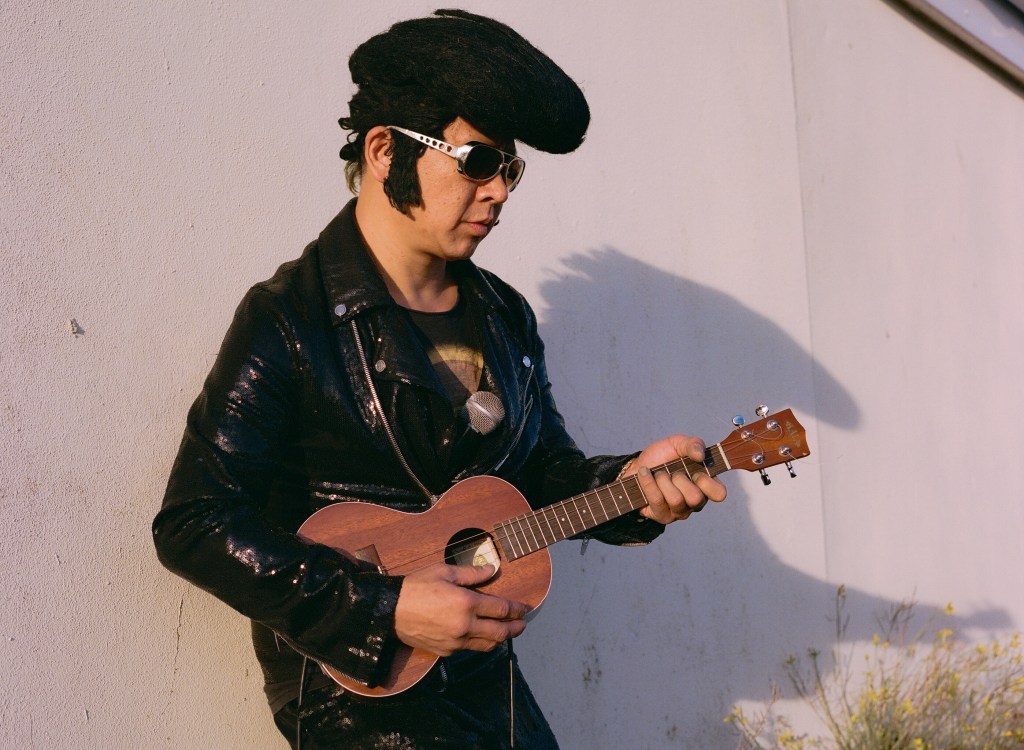
In our final encounter, Priscilla and Elvis—two tribute artists who found each other and fell in love through their shared devotion to the King—both declined to share their political opinions, fearing they might spark some kind of backlash. (What form they thought this backlash might take, they failed to clarify.) They also didn’t feel that an Elvis impersonation festival in South Wales was the right place to try to thrash out a consensus on political matters. Of all the strange opinions we’d heard in Porthcawl that day, this might have been the weirdest.
This story is from the summer 2025 issue of VICE magazine, THE REASONS TO BE CHEERFUL ISSUE. Get 4 issues each year, sent straight to your door, by subscribing here.
Report: Leah Rustomjee
Additional Reporting: Coco Wouters
Photos: Ellie Ramsden
Data Vis: Chelsea White
The post We Asked Elvis Impersonators to Design Their Own New Nation-State appeared first on VICE.
